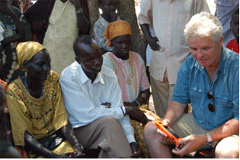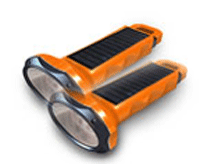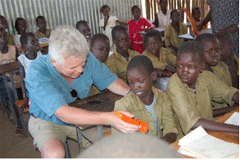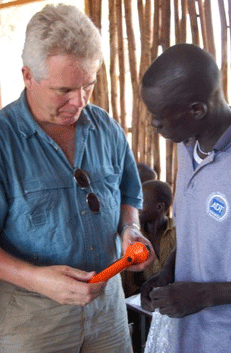Shine A Light
Air Date: Week of June 1, 2007

Mark Bent demonstrates the solar powered flashlight in a refugee camp in Fugnido, Ethopia. (Courtesy of Mark Bent)
After a career in the Marines and Foreign Service, Mark Bent has dedicated himself to bringing light to the billions of people in the developing world without electricity. He spoke with host Bruce Gellerman about his “buy one, give one” solar flashlights.
Transcript
GELLERMAN: Edith Wharton once wrote: “There are two ways of spreading light….to be the candle or the mirror that reflects it.”
Well, former Marine Mark Bent is trying to spread light both ways. And if his company Sun Night Solar is successful it will illuminate lives in ways never before possible. Sun Night Solar makes the Bogo Light. Instead of using expensive, disposable batteries, Bogo Light flashlights draw their power from the sun. And also fuel Mark Bent’s other goal--to shed light in places now dark due to poverty and war.
Mark Bent joins me from Houston, Texas. Hi Mark.
BENT: Hello Bruce.
GELLERMAN: Well, I’ve got one of your flashlights in my hand. It’s orange but it’s not like any flashlight I’ve ever seen. Why don’t you describe it for me?
BENT: Sure it’s a rechargeable battery flashlight, it’s a task light. It’s got a solar panel on the side. It’s got light emitting diodes in it, six of them, super bright. And it’s got three rechargeable double A NiCad batteries. And what it’s designed for is to provide light to the developing world.

The Bogo-buy one give one-solar powered flashlight.(Courtesy of bogolight.com)
BENT: Because the concept is buy one give one. An American buys a light and they give one away. An American can buy my flashlight for 25 dollars and for that price, no more money, I deliver a second light to Africa. I put it in Africa. And I give a non-profit like United Nations High Commission for Refugees or Samaritan’s Purse or Save the Children, or Feed the Children, all my partners, I give them a light and they pass it out as part of their community service and work.
But also being a former Marine, I have a deep affection and love for my brothers in uniform and so you also have the ability, if you like, to donate them to the troops either in Afghanistan or in Iraq.
GELLERMAN: How did you get this bright idea?
BENT: Well I lived in Africa for about 20 years, first as a Marine then as a diplomat with US foreign service and the last five years as an oil executive. I was running a subsidiary of an oil company in Eritrea and my employees, who I cared for deeply, knew I was leaving and I wanted to do something for them that was more than just a temporary fix so I went to some of their villages and they were still using kerosene lanterns. And so when it hit me really hard that lighting was such an integral part of their lives and they couldn’t afford it I really wanted to do something so I felt compelled to move in this direction.

Mark Bent gives a child in Fugnido, Ethopia a solar powered flashlight. (Courtesy of Mark Bent)
BENT: The World Bank estimates 1.6 to 2.2 billion people, so we’re talking one third of the world is off the grid. And if you’re off the grid you have to rely on three things: kerosene, candles, and conventional flashlights. Now kerosene is bad for the environment. It’s bad for people breathing in the fumes. 1.6 million people, mostly women and children die of cancer each year because of the fumes from kerosene. One kerosene lantern puts out 100 kilos of carbon gases a year. And so you talk about the number of people that use kerosene lanterns and so that’s really bad.
And the other issue is even here in the United States most people don’t recycle their batteries. EPA states that less than one percent of our landfill waste is batteries but it’s our number one contaminant for ground water contamination with mercury and cadmium and all the other heavy metals that go into the ground water. But with my flashlights they use three nickel cadmium batteries. Right now the batteries will last 750 to a 1000 nights. And so a child or an adult can use the lights for six to seven hours a night for two years plus before the batteries need to be replaced. So we’ll ship in more batteries and do a replacement program to get the batteries out of Africa.

Mark Bent explains features on the solar powered flashlight. (Courtesy of Mark Bent)
BENT: Yeah, what I wanted to do was to get lights to people that really needed them that couldn’t afford them. The World Bank estimates that the average African spends up to one third of their income on kerosene. But look at the economic benefit to an African. If you’re taking away 30 percent of their expenditures you’re giving them a 30 percent raise basically because no longer do they have to pay for the kerosene. You’re allowing them to have a massive economic upgrade in their lives.
Africans aren’t stupid, they just don’t have capital. They don’t have the ability to put things on a credit card, for example, like we do. And so if you give them a 30 percent increase in their disposable income they’ll spend it on an extra chicken or they’ll spend it on extra land to grow tomatoes or maize. And they will be able to leap out of that bottom level of poverty because it gives them that little bit of a head start. All this does is give them that head start which I think is fantastic.
GELLERMAN: What is the saying, “It’s better to light a single candle than to curse the darkness?”

Mark Bent demonstrates the solar powered flashlight in a refugee camp in Fugnido, Ethopia. (Courtesy of Mark Bent)
What I wanted to do was to give them, the Africans, something that empowers them. And it’s an amazing thing. It helps out with education, it helps out with the environment, security in refugee camps. One of the big problems in refugee camps at the UN is violence, sexual violence at night. So we designed this with a finger grip on one side so a woman at night can reach out and touch it and know exactly where the light switch is. It has a glow in the dark ring on it that actually my 15-year-old daughter came up with the idea of doing that. So it really impacts people’s lives in an amazing way.
GELLERMAN: It’s amazing that one light can make such a difference. That’s what’s so stunning about this to me.
BENT: It’s a great feeling when I get discouraged or I get depressed and I think that there’s someplace in the world that’s dark right now and there’s a little kid that’s reading because of my light. We got a note the other day from one of the Sudanese that’s in a refugee camp in Ethiopia and the refugee said that he’d never had such privilege in his life. And it just broke my heart that here we gave him a light, you know, a light that to us is basically a toy but to him it’s the greatest privilege he had. He had no other privilege like that in his life. And that amazes me that something as simple as some plastic and LEDs and a solar panel changes somebody’s life that way.
GELLERMAN: Well, Mark, thank you very much.
BENT: Thank you, Bruce.
GELLERMAN: Mark Bent is founder of Sun Night Solar, makers of the Bogo light.
[MUSIC: The Album Leaf “The Light” from ‘Into The Blue Again’ (Sub Pop Records – 2006)]
Links
Living on Earth wants to hear from you!
Living on Earth
62 Calef Highway, Suite 212
Lee, NH 03861
Telephone: 617-287-4121
E-mail: comments@loe.org
Newsletter [Click here]
Donate to Living on Earth!
Living on Earth is an independent media program and relies entirely on contributions from listeners and institutions supporting public service. Please donate now to preserve an independent environmental voice.
NewsletterLiving on Earth offers a weekly delivery of the show's rundown to your mailbox. Sign up for our newsletter today!
 Sailors For The Sea: Be the change you want to sea.
Sailors For The Sea: Be the change you want to sea.
 The Grantham Foundation for the Protection of the Environment: Committed to protecting and improving the health of the global environment.
The Grantham Foundation for the Protection of the Environment: Committed to protecting and improving the health of the global environment.
 Contribute to Living on Earth and receive, as our gift to you, an archival print of one of Mark Seth Lender's extraordinary wildlife photographs. Follow the link to see Mark's current collection of photographs.
Contribute to Living on Earth and receive, as our gift to you, an archival print of one of Mark Seth Lender's extraordinary wildlife photographs. Follow the link to see Mark's current collection of photographs.
 Buy a signed copy of Mark Seth Lender's book Smeagull the Seagull & support Living on Earth
Buy a signed copy of Mark Seth Lender's book Smeagull the Seagull & support Living on Earth

